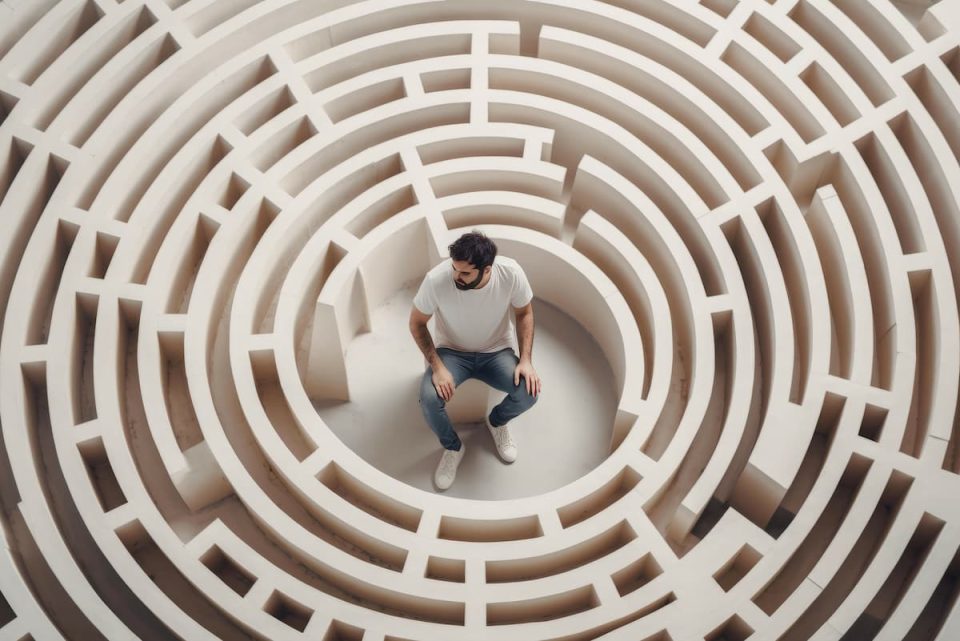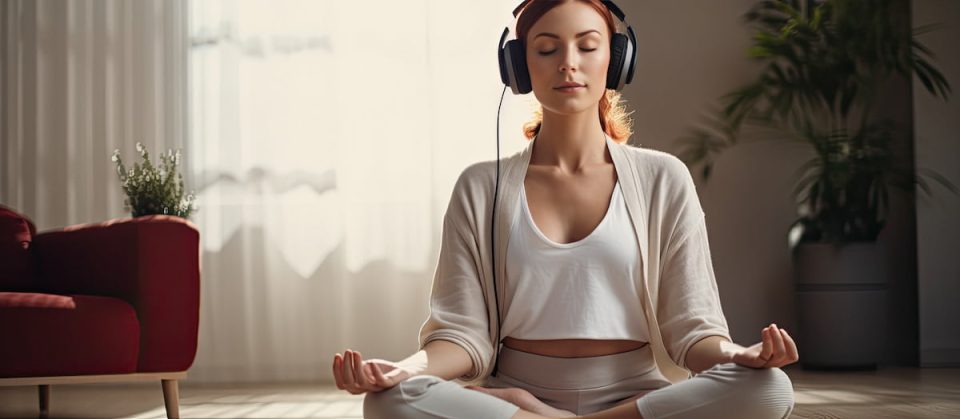Anxiety has become a defining feature of modern Western life, with surveys identifying anxiety disorders as the most common mental illness in the U.S. (affecting roughly 40 million adults, or nearly one in five people according to medicalnewstoday.com. Globally, about 300 million people suffer from an anxiety disorder. While individual temperament and biology play a role, many sociologists and cultural critics argue that the roots of today’s “age of anxiety” lie in broad social transformations. In particular, the decline of religious and ancestral traditions – alongside the rise of secular, hyper-individualistic, and technologically-saturated culture – has created a perfect storm of existential uncertainty. Below, we examine key sociocultural drivers of anxiety in the contemporary West, drawing on mainstream sociological perspectives and also the insights of alternative thinkers who critique modernity’s impact on mental health.
The Loss of a Sacred Canopy: Secularization and Meaning
One widely cited cause of heightened anxiety is the secularization of Western society – the fading influence of organized religion and spiritual worldviews that once provided a “sacred canopy” of shared meaning and moral guidance. In past generations, religious traditions offered a communal framework through which individuals understood their purpose, morality, and place in the cosmos. Churches, synagogues, and other faith communities were hubs of social support and provided narratives to cope with life’s trials and the inevitability of death. As these institutions recede, many people are left without a ready-made system of meaning or comfort for existential concerns. Sociologist Peter Berger famously described how modernization “removes the domination of religious institutions” over society, leaving belief a private choice (digitalcommons.denison.edu). Without the old “transcendent frame” of religion, people operate within what Charles Taylor calls an “immanent frame” fixated only on the material world – a condition that “creates anxiety and malaise” as humans strain to find higher purpose in a purely secular life (realclearreligion.org)
Results of Rapid Modernization: Unguided and Adrift
Classic sociology warned of the mental distress that can follow the breakdown of shared norms. Émile Durkheim observed over a century ago that rapid modernization and declining religion led to anomie – a state of normlessness where individuals feel unguided and adrift. Durkheim introduced the concept of “anomie” to capture how a person “can suffer from having too much freedom, from being too little regulated by social institutions.” In his view, the erosion of social and moral regulation leaves individuals isolated and anxious (prospectmagazine.co.uk).
More recently, psychologists have empirically found that a secure sense of meaning in life strongly protects mental health, whereas a “crisis of meaning” (feeling life is empty or purposeless) heightens distress (pmc.ncbi.nlm.nih.gov). In secular societies, finding meaning is no longer a given – it becomes a personal quest, which can provoke chronic anxiety about whether one’s life has significance.
The Spiritual Void behind Modern Anxiety
Alternative thinkers underscore the spiritual void behind modern anxiety even more bluntly. The influential psychotherapist Carl Jung noticed that many of his mid-life patients were plagued by problems stemming ultimately from the loss of any spiritual outlook. He remarked that “every one of them fell ill because he had lost what the living religions of every age have given their followers”, and none truly recovered without regaining a spiritual perspective (libquotes.com).
Likewise, some contemporary authors argue that human beings are “not well-suited to radical immanence” – a life with no sense of the transcendent – and that this disconnect between our inherent spiritual needs and an aggressively secular culture “creates anxiety and malaise.” In the absence of healthy outlets for the “religious impulse,” people may chase dysfunctional substitutes (consumerism, ideological extremism, etc.) in ways that “only make things worse.”(realclearreligion.org). In short, the decline of religious tradition has left a vacuum of meaning that contributes to pervasive anxiety about “what it’s all for.”
The Decline of Communal Rituals and Rites of Passage
Traditional societies everywhere develop rites of passage and communal rituals to mark life’s transitions – guiding people through changes with collective support and a sense of certainty. In modern secular life, however, many of these structured rituals have withered. Fewer people participate in religious ceremonies, and longstanding cultural rites (for coming-of-age, marriage, etc.) have lost their prominence or meaning. Sociologically, this loss matters: anthropologists like Arnold van Gennep and Victor Turner noted that rites of passage help individuals navigate the liminal (in-between) stages of life with less anxiety. These rituals provide a “before and after,” giving one a clear sense of progression and inclusion in the community (psychiatryinstitute.com). Without them, people may feel unmoored during major life changes.
Why Birthday Celebrations are Not Enough
In Western societies today, formal coming-of-age ceremonies (such as religious confirmations, bar mitzvahs, debutante balls, etc.) are no longer universal. We still celebrate milestones like graduations or birthdays, but these often lack the “depth of more ancient rituals” and may be treated as casual parties rather than profound communal transitions (psychiatryinstitute.com).
This shift has consequences. Research in integrative psychiatry suggests that “in modern Western society, [important] rituals have largely faded into the background, leaving a gap that is increasingly felt.” The absence of rite-of-passage structures can leave people “feeling lost and alienated.” As one PhD researcher put it, “The lack of such rituals can lead to feelings of disconnection from self and others, anxiety, and even existential crisis.” (psychiatryinstitute.com)
Many young adults stumble into adulthood without any clear marker of when or how they became “adult” in the eyes of their community, and without mentorship to guide them. This can manifest as anxiety, inadequacy, and prolonged identity confusion. By contrast, in cultures that maintain strong rituals (tribal initiation rites, communal ceremonies for marriage and death, etc.), individuals often report a greater sense of emotional security and belonging during life transitions. In the West’s fast-paced and fragmented culture, the ritual gap means people must face big changes (puberty, entering the workforce, aging) without the comforting roadmap that tradition once provided – a recipe for heightened anxiety.
Hyper-Individualism and the “Alone Together” Paradox
Another key cultural factor is the rise of hyper-individualism: the shift from collective, community-rooted identities to an ethos in which each person is expected to “make” themselves independently. Western societies have increasingly celebrated personal autonomy, but an unintended consequence is the fraying of communal ties and support structures. Social critics note that over recent decades, civic engagement and community life have eroded – a trend famously documented by Robert Putnam as the move from community bowling leagues to “Bowling Alone.” With family, community, and neighborhood bonds weaker than before, many people have fewer buffers against stress. They may feel alone in dealing with life’s pressures, fueling anxiety.
The State of “Liquid Modernity”
Sociologist Zygmunt Bauman described contemporary life as “liquid modernity” – a fluid state where stable institutions (family, community, religion) have largely melted away. While this liberates the individual, it also “leads to alienation, anxiety, and social disconnection,” as people enjoy more freedom but experience greater isolation and a “lack of meaning due to the absence of stable social structures.” (simple.wikipedia.org) In a culture dominated by individualism and consumerism, individuals may constantly compare themselves to others’ achievements and feel never “good enough,” exacerbating social anxiety and insecurity.
Individualism is Not Bad – It’s How we Do it that Matters
Importantly, individualism per se is not “bad” – it can foster personal growth and freedom. The problem arises when extreme individualism is paired with the loss of collective support and guiding norms. Without community or tradition to lean on, people shoulder every burden alone, from economic survival to personal identity construction. Durkheim argued that when social bonds weaken, people can experience anomie and distress even amid freedom (prospectmagazine.co.uk).
The Surge of ‘Collective Loneliness’
More recently, observers have seen a surge of what one might call collective loneliness: people are physically surrounded by others, yet lack a feeling of belonging. Everyone is busy cultivating their own lives, and the result can be a pervasive sense of disconnection. This isolation can itself breed anxiety – humans are social creatures, and chronic loneliness is strongly linked to anxiety and depression. In sum, the hyper-individualistic turn in Western culture has created conditions of social fragmentation where many face their worries without a reliable communal “safety net.”
The Burden of Self-Definition: Identity and Existential Anxiety
With old frameworks of meaning and identity weakened, modern individuals carry a heavy burden: the pressure to define oneself and one’s purpose in life from scratch. In a traditional setting, a person’s role, values, and community were largely “given” – one might be born into a certain faith, class, or familial trade that shaped life’s trajectory. Today, especially in pluralistic Western cultures, the message is that each person must choose their own path, values, career, lifestyle, and even identity (in realms from gender to profession) to construct a meaningful life. While this freedom is empowering, it is also deeply stress-inducing. The existential philosopher Søren Kierkegaard observed long ago that too much choice can produce dizziness. He famously said, “anxiety is the dizziness of freedom”, arising when an individual, facing boundless possibilities, feels overwhelming uncertainty about what to choose (philosophynow.org). Modern people are bewildered by their own freedom – expected to continuously make the “right” choices and create meaning without firm guidance, a condition that easily leads to anxiety.
“Am I good enough?”
Late-modern social theorists have made similar points. Anthony Giddens noted that life in contemporary society becomes a “reflexive project” – an ongoing effort of self-construction in a world where traditions no longer dictate who you are. Every decision (education, career, relationships, beliefs) feels loaded with significance because you alone are responsible for the outcome. This responsibility can breed chronic self-doubt (Am I doing the right thing? Am I good enough?), a hallmark of anxiety.
“You can be anything”
An analysis from the Martens Centre describes how as Westerners “abandon normative suggestions about the meaning of life,” many are left “adrift, without a clear sense of purpose or direction.” Individuals enjoy the liberty to define their own values, but “when coupled with the erosion of traditional norms and guidance,” this liberty leaves many “struggl[ing] to find a sense of purpose, leading to a growing crisis of meaninglessness.”(martenscentre.eu) In effect, society tells people they can be anything, but provides little help in what to be – resulting in a constant background anxiety about whether one’s life is meaningful or on the right track.
The “Will to Meaning”
From a psychological perspective, this is an engine for existential anxiety. Humanistic psychologists like Viktor Frankl saw the “will to meaning” as a fundamental drive; when frustrated, it results in an “existential vacuum” marked by boredom, apathy, and often despair or anxiety. Modern Westerners, especially youth, sometimes fall into exactly this vacuum: rejecting tradition’s answers but struggling to create their own.
“What should I do with my Life?”
The focus on hedonic well-being (seeking pleasure, consumer comforts) in the absence of deeper eudaimonic purpose can leave people “perpetually dissatisfied and anxious about the next source of pleasure.”(martenscentre.eu) Even when material needs are met, a person may lie awake at night ruminating on questions like “Who am I really? What should I do with my life?” – questions that, without any guiding narrative, spur anxiety. In traditionalist critiques, this is why some argue for a return to shared values or “re-enchantment” of the world. As one commentator put it, “there is an impression that Western culture has abandoned guidelines related to meaning, encouraging individuals to find their own meaning… [but] a large portion of individuals feel lost in the process.”(martenscentre.eu) The expectation that one must “create one’s own meaning” sounds liberating, but for many it is a heavy psychological load contributing to widespread anxiety and existential insecurity.
Technological Amplification: Social Media and 24/7 Connectivity
No analysis of modern anxiety is complete without addressing how technology and social media have amplified these cultural pressures. Over the last 15 years, the smartphone and social media revolution have fundamentally altered how people interact and perceive themselves. These technologies often intensify individualism and social comparison in ways that feed anxiety.
The Dangers of a Personal ‘Brand’
Social media platforms encourage users to craft a curated personal “brand” or narrative – essentially, to constantly define and perform their identity for an audience. This performance pressure dovetails with the self-definition burden discussed above, potentially worsening self-consciousness and anxiety. People may feel anxious if their life doesn’t seem as glamorous or purposeful as the images they scroll past each day.
“Fear of missing out” (FOMO) is now a recognized phenomenon: seeing peers’ highlight reels online can make individuals feel inadequate or excluded, sparking anxious thoughts. As a McLean Hospital psychologist noted, even with minor tweaks like hiding “like” counts, “people still can compare themselves to others” on social media, which can fuel anxiety and low self-esteem (mcleanhospital.org).
Addictive Design of Social Media – Habit-Forming, Anxiety-Inducing
Research consistently links heavy social media use with increased anxiety, especially among young people. The addictive design of apps (notifications, infinite scroll) keeps users constantly engaged, which can lead to dopamine-driven habits but also stress. One report bluntly states: “Using social media can cause anxiety, depression, and other health challenges.” The platforms are engineered to be habit-forming and are associated with heightened anxiety and even physical symptoms of stress (mcleanhospital.org). In the U.S., about 69% of adults and 81% of teens use social media, meaning a huge swath of the population is exposed to these anxiety-provoking dynamics. When virtually everyone is online, social expectations also become more demanding – from replying to messages instantly to maintaining a constant stream of posts. The result is a relentless connectivity that paradoxically can increase feelings of inadequacy and worry. Psychologists observe that “missing experiences can create anxiety” – for instance, seeing friends post about a party you weren’t invited to can trigger acute feelings of rejection. Over time, these micro-burdens accumulate into chronic social anxiety.
“Liquid Fear” of Digital Media
Digital media bombard individuals with information about global crises (pandemics, climate change, political turmoil) in real time. While previous generations might learn of distant bad news slowly or sparingly, today’s user is continually aware of everything going wrong everywhere. This 24/7 news cycle contributes to a general climate of anxiety – a sense that the world is an unstable, frightening place. Some scholars like Zygmunt Bauman even label ours a time of “liquid fear,” where diffuse anxieties (terrorism, economic precarity, etc.) are pervasive. Social media amplifies this by virally spreading alarming content and often blurring credible information with rumors, which can heighten paranoia and uncertainty.
Is Your LinkedIn Adding to your Anxiety?
Technology also facilitates the spread of “comparison culture” – e.g., LinkedIn and Instagram constantly remind you of others’ career milestones or life milestones, potentially intensifying personal anxiety about falling behind.
In summary, the digital landscape acts as a force-multiplier for the other cultural anxieties: it magnifies feelings of isolation (everyone lost in their screen), it escalates identity pressures (comparing profiles), and it fills the mental environment with stimuli that keep the brain on edge.
Embracing the Age of Becoming: Moving Beyond Anxiety
Yes, we grapple with profound anxiety rooted in the loss of structure and belonging. But we also live in extraordinary times—times filled with immense potential. It can be daunting to carry the full weight of meaning-making on our own shoulders, but we are perfectly capable of it. In fact, we are already doing it. We are waking up to the reality of our situation, seeing it clearly, and generating ideas and solutions in response.
You have the Freedom to Define Yourself
This is a great time to be alive. You have the freedom to define who you are and who you want to become. Yes, some guidance along the way wouldn’t hurt—but here’s the thing: you already have guidance. Your personal history, everything you have experienced, all the choices you’ve made, the obstacles you’ve overcome—these provide a rich foundation for meaning-making. You are ready for this. You don’t need the old frameworks.
Your Identity is not Fixed – It’s an Ongoing Process
Your identity is not fixed; it is evolving as you are in the process of becoming. You will experiment with different versions of yourself—on and off social media—and that’s not only okay, it’s necessary. This is how we figure out who we want to be. Don’t be afraid to ‘perform’ a different identity—after all, life itself is a grand stage, and as Shakespeare famously said:
“All the world’s a stage, and all the men and women merely players; they have their exits and their entrances, and one man in his time plays many parts.” (As You Like It, Act II, Scene VII)
There Are Ways to Navigate the Uncertainty
If the anxiety and uncertainty ever feel overwhelming—as they sometimes will—there are ways to help yourself. Some are simple coping strategies. Others are traditional, like building communities and supporting each other, which has always been a source of strength. And then there are the paths of brave exploration—methods that offer guidance without prescribing rigid answers.
One such path is the FLOW Method. It is a new approach that doesn’t tell you what to do, but rather how to explore. It provides a gentle framework for navigating identity, uncertainty, and self-discovery—not by giving you a set script, but by empowering you to write your own.
So here’s my invitation to you: give it a try. Step into the unknown with curiosity, knowing that you are more than capable of shaping your own meaning, your own story. You are already becoming. And that, in itself, is something truly powerful.


